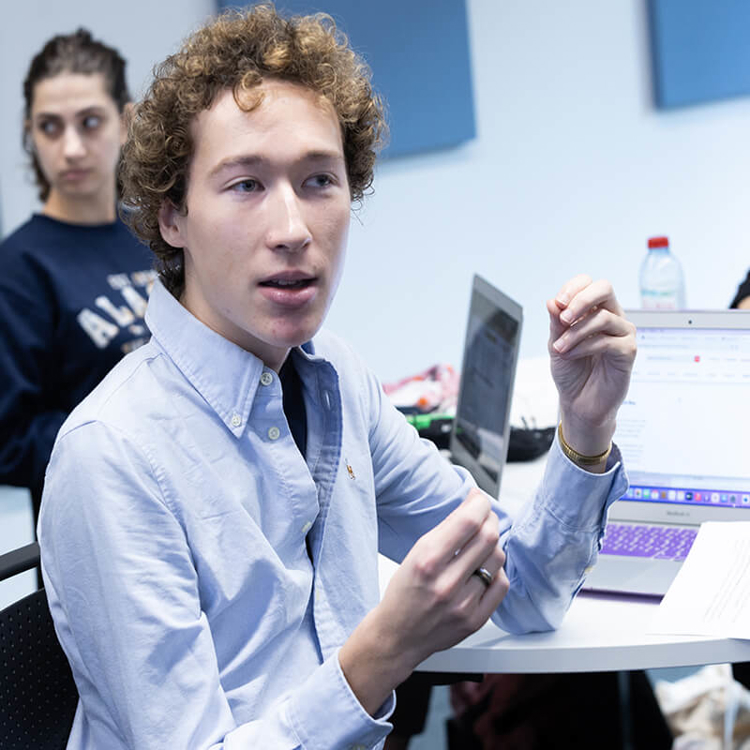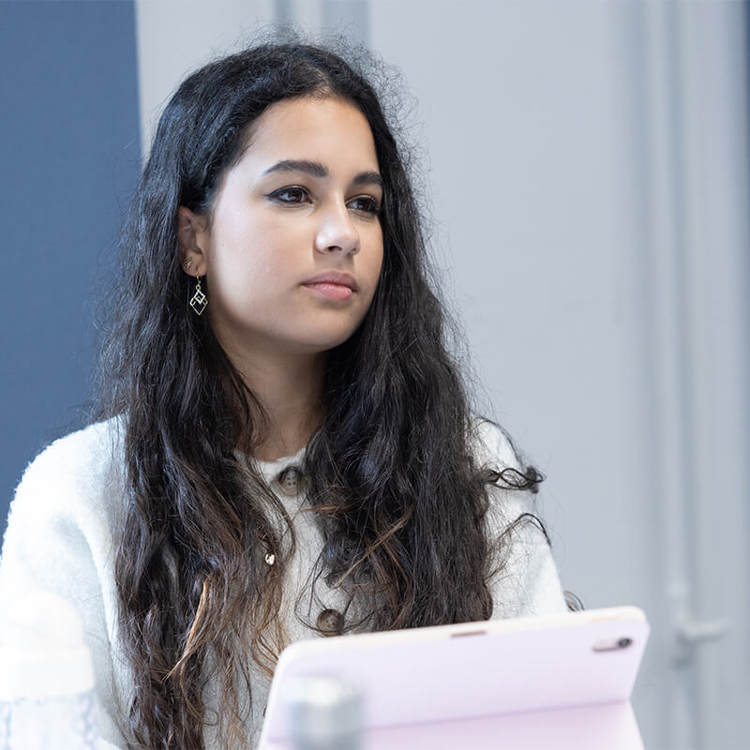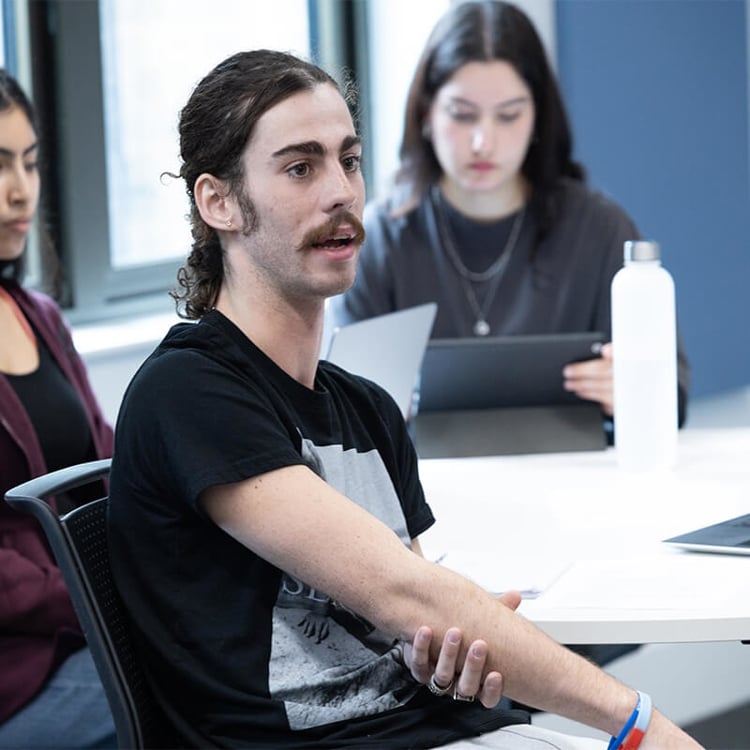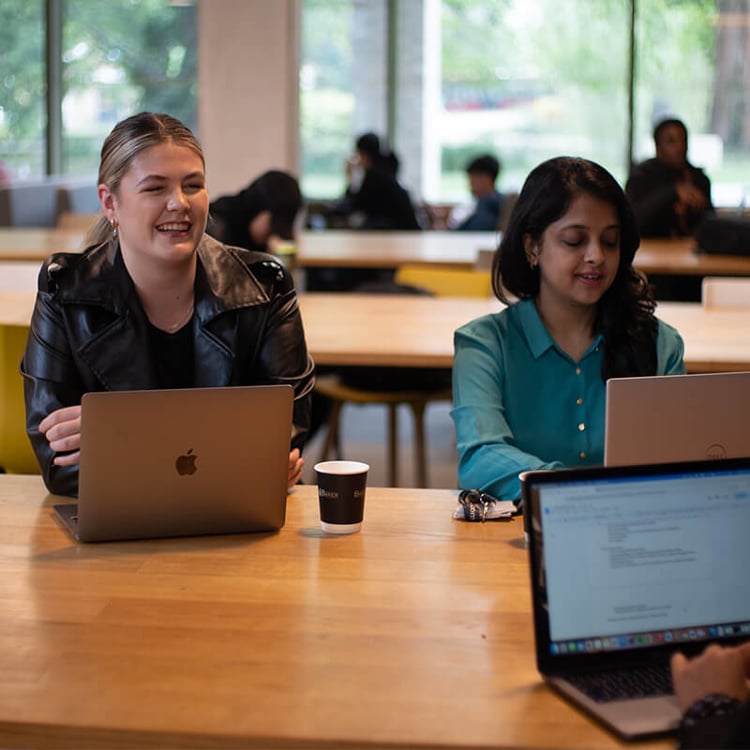Entry tariff:
96–112 UCAS points (or equivalent)
Foundation Year: 64–80 UCAS points (or equivalent)
International Foundation Pathway:
64 UCAS (or equivalent)
IELTS: 5.5
UCAS code:
TBC
TBC (if choosing Foundation Year)
Start date(s):
September 2026
Turn data into insights that drive real business decisions.
Our BSc Business Analytics degree will give you the practical analytical skills needed to analyse, visualise, and interpret complex data through hands-on projects and real-world business challenges.
You will develop both technical proficiency and business insight, enabling you to analyse data effectively and translate findings into strategic and operational recommendations.
Through a hands-on, vocational approach, you will work with industry-standard tools, including SAS, Tableau, and Python, alongside applied skills in prompt engineering, LLM-based analytics, dashboarding, and visualisation. Learning is grounded in authentic business problems, case-based learning, and extensive computer-lab teaching, emphasising the interpretation, application, and communication of data to support business decisions.
Our partnership with the SAS Institute, will give you access to AI-enabled data management, statistical analysis, and business analytics tools. This partnership supports the development of flexible, future-ready skills and ensures you can adapt to evolving analytics and AI technologies. Additional strengths include professional certifications, a focus on finance and sector-specific analytics, and a strong emphasis on translating data into actionable business insight, giving the degree a clear and distinctive character.

Why study business analytics at Roehampton?
Gain a competitive edge by tackling current challenges, learning the tools and methods used by professionals, alongside career support.
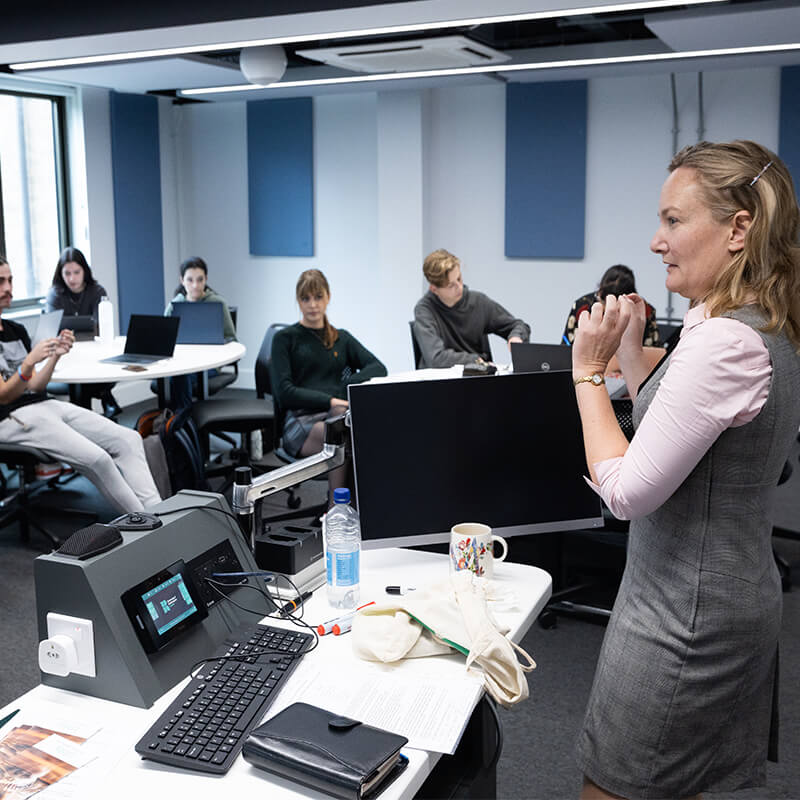
Case-based learning
Our immersive block-teaching timetable, with two focused days of in-person teaching, supports deeper learning, reflective practice and co-curricular engagement that will prepare you to apply data analytics to real organisational scenarios and problems.

Robust employment support
We’ll be with you at every step to get you the career you want, with coaching, mentoring, CV and interview preparation support and you’ll also have access to employer-led sessions, where you can build your employability network.
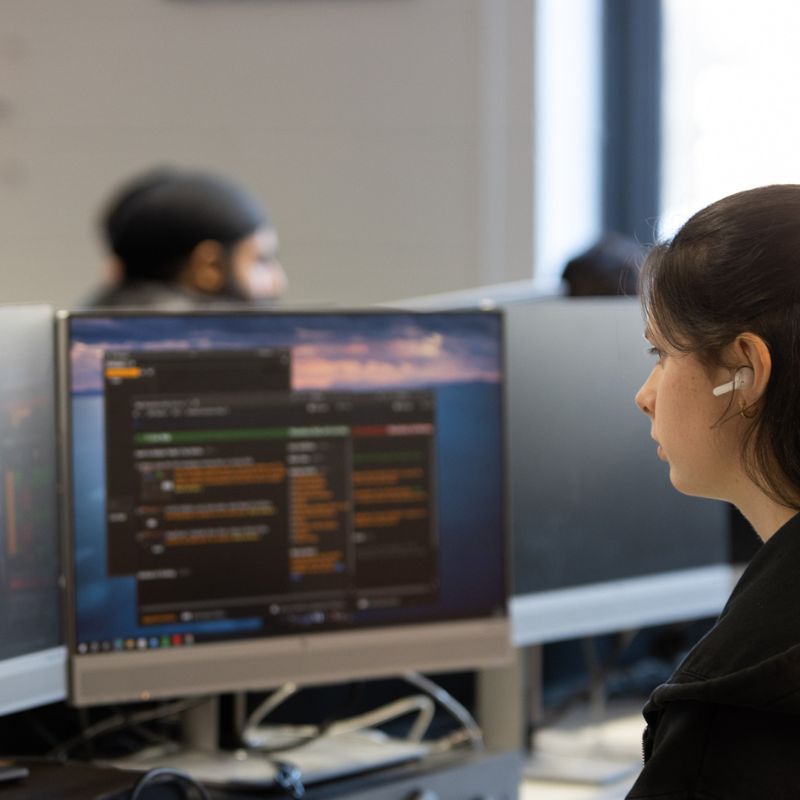
Roehampton Business Laboratory and Bloomberg Trading Room
Our business lab is the perfect space for you to incubate and develop your entrepreneurship activities, and you’ll have access to real-time industry standard information on our Bloomberg terminals.
30 credits
This module covers topics of mathematics and statistics, where you will become familiar with data analysis.
You will learn to apply quantitative methods to evaluate real-world issues related to equity and diversity. For instance, you will learn how statistical analysis can uncover disparities. Focusing on data interpretation and optimisation, you'll learn about the tools and techniques that can be used to evaluate efficient resource allocation and sustainable (optimal) investment strategies.
You will gain experience of working with applications such as Excel and Stata.
Teaching and learning
You will be taught through lectures and workshops that are underpinned by case-based learning. You will also have access to online support and employability-related activities.
Lectures will cover core material, while workshops will engage you in solving practical exercises aimed at supporting and consolidating your learning.
Assessment
This module will be assessed by a multiple-choice test (70%) and coursework (30%).
30 credits
You will develop your talent, skills and competencies through focused business readiness activities and live global multicultural challenges. We apply industry specific knowledge; use practical case examples; live case studies and issues to draw out the skills and professional attitudes valued by employers; theoretical models and concepts to enable you to gain an understanding of industry requirements helping you transition into employment or entrepreneurship. We use a coaching approach to teaching to build confidence, critical thinking and embed learning into practice.
The module also allows for skill development, competencies in written academic, verbal and technological enquiry/research activities to help you progress through your chosen degree of study. It lays the foundation for further competency development needed to progress through each year which will be built on by other modules. You will engage in learning activities which develop your inclusive leadership skills and competencies in working in global and multi-cultural settings.
You will learn how to transform yourself professionally, enhance your career trajectories, and excel in your chosen fields while navigating the challenges of technological advancements, ethical and sustainability dilemmas, and the evolving demands of the modern workplace.
Topics covered include:
- Developing business sector awareness in team situations and meeting industry challenges
- Inclusive leadership and sustainability practices
- Your future careers, talent management, recruitment and selection, reflective practice, academic skills and technology working
Teaching and learning
You will be taught through lectures and workshops that involve a range of learning and teaching approaches, which includes online support and employability-related activities.
Lectures will be developed around the key concepts, models and frameworks around employability and the world of work, technology and competency development, talent acquisition, careers development and enterprise development.
Seminars will concentrate particularly on the elaboration of specific theoretical approaches with reference to their possible application through the selection of case examples, live business challenges, simulated recruitment and selection activities.
Assessment
This module will be assessed by a professional pitch and personal brand portfolio (50%) and a reflective report (50%).
30 credits
This module develops practical data preparation and automation skills through intensive hands-on computer labs and real-world business challenges.
Using Excel, Python (including Pandas) and SQL on messy datasets, you'll learn to clean, integrate and automate data workflows. A coaching approach builds technical confidence, problem-solving and ethical awareness, while collaborative labs foster inclusive teamwork with diverse global data.
This module equips you to build robust, analysis-ready data pipelines and prepares you for professional analytics roles in an increasingly automated and ethically complex workplace.
Teaching and learning
You will be taught through lectures and workshops that involve a range of learning and teaching approaches, which includes online support and employability-related activities.
Lectures will be developed around the key concepts, models and frameworks around employability and the world of work, technology and competency development, talent acquisition, careers development and enterprise development. It uses a range of examples and cases from practice and society to demonstrate the application of concepts.
Seminars will concentrate particularly on the elaboration of specific theoretical approaches with reference to their possible application through the selection of case examples, live business challenges, simulated recruitment and selection activities e.g. assessment centre and interviewing practice; coaching conversations, panel discussions and talks.
Assessment
This module will be assessed by an individual report (50%) and an individual portfolio (50%).
30 credits
You will be introduced to key concepts and issues relating to business organisations in global environments.
You will focus on globalisation and the different types and objectives of business organisations. You will then cover a range of topics related to assessing the environments within which businesses operate such as economic growth, international trade and global industries. The link between business organisations and environments is further examined within the context of analytical frameworks such as PESTLE, Porter's 5 Forces and Demand/Supply analysis.
Teaching and learning
You will be taught through lectures and workshops that involve a range of learning and teaching approaches, which includes online support and employability-related activities.
Lectures will cover core business environment concepts and analytical frameworks, while workshops will engage you in solving practical global business challenges and strategic decision scenarios.
Workshops will consist of a blend of interactive global business simulations, group work on international market analysis and strategic decision-making exercises, and debates on contemporary global economic issues designed to support analytical and cross-cultural communication skills development.
Assessment
This module will be assessed by a reflective journal (30%) and coursework (70%).
These are the current planned modules on this course and may be subject to change.
30 credits
The module aims to introduce you to the risk/return characteristics of both traditional and alternative investments. This module considers these characteristics in isolation but also introduces how these characteristics will suit the needs of different individual and institutional investors. In addition, this module will focus on firm-level valuation.
This module will also give you the analytical skills to assess complex issues and apply specialised technical expertise to inform strategic decision-making. This includes the selection of suitable investment pots from a wide variety of asset classes and products, such as equity, fixed-income securities, properties, derivatives, commodities, and cryptocurrencies. Additionally, it provides investment solutions in the context of risk-return tradeoffs that are tailored to the unique risk profiles and investment requirements of individual and institutional investors.
You will gain a comprehensive overview of firm valuation, including advanced valuation tools including adjusted present value approaches, valuing money-losing firms, valuing young or start-up firms, and probabilistic approaches in valuation (e.g., scenario analysis, decision trees, and simulations).
You will be equipped with the knowledge and skills necessary to incorporate non-financial information, such as environmental, social, and governance factors, as decision input when analysing investment strategies. Consequently, you will be able to understand the magnitude of the challenge in terms of the value of assets at risk in accordance with climate and sustainability objectives that are aligned with the UN Sustainable Development Goals (SDGs).
Teaching and learning
You will be taught through lectures and workshops that involve a range of learning and teaching approaches, which includes online support and employability-related activities.
Lectures will cover core asset valuation techniques, while workshops will engage you in solving practical exercises aimed at supporting and consolidating your learning.
You will build yourdigital skills in various ways, including accessing online resources, using advanced valuation tools and financial modelling techniques.
Assessment
This module will be assessed by a multiple-choice question test (30%) and a case study report (70%).
30 credits
This module explores how businesses use data to understand consumers and make smarter marketing decisions, with a main focus on Google Analytics 4 (GA4).
You will learn how to track online consumer behaviour, analyse digital journeys, and uncover insights using GA4. Excel is used for data handling and analysis, while Power BI supports data visualisation.
The module also introduces Mintel for broader market context. Topics include consumer decision-making, cultural influences, ethics, and sustainability. It is practical and career-focused, helping you develop the skills to create inclusive, ethical, and effective marketing strategies for local and global markets.
Teaching and learning
You will be taught through lectures and computer-based seminar labs to help you learn both theory and practical skills. Weekly lectures will introduce key marketing and consumer behaviour concepts, providing a strong academic foundation.
In seminar labs, you will work hands-on with tools like Google Analytics 4 (GA4), Excel, and Mintel to analyse real consumer data. These sessions include group discussions and practical exercises, enabling you to apply theory to real-world situations.
You will also engage in group activities to build skills in research, critical thinking, and communication. This blended approach ensures you develop the knowledge and experience needed for careers in marketing and data analysis.
Assessment
This module will be assessed by a GA4 Insights Presentation (30%) and an individual report (70%).
30 credits
This module will develop your practical skills in data visualisation and storytelling through intensive hands-on computer labs and authentic business intelligence challenges.
Using industry-standard visualisation platforms, real-world datasets and live organisational scenarios, you will gain the design, communication and presentation skills valued by employers.
A coaching approach builds creative confidence, critical design judgement and the ability to turn complex data into compelling, decision-driving narratives, while preparing you for a globally recognised desktop certification through integrated bootcamp workshops. It establishes core visualisation, dashboarding and storytelling skills built on by later modules, while inclusive lab activities develop teamwork with diverse global datasets.
This module will equip you to create visually powerful, accessible dashboards that influence strategy and prepare you for high-demand business intelligence and analytics communication roles in an insight-driven workplace.
Teaching and learning
You will be taught through lectures and workshops that involve a range of learning and teaching approaches, which includes online support and employability-related activities.
Lectures will be developed around the key concepts, models and frameworks around employability and the world of work, technology and competency development, talent acquisition, careers development and enterprise development. It uses a range of examples and cases from practice and society to demonstrate the application of concepts.
Seminars will concentrate particularly on the elaboration of specific theoretical approaches with reference to their possible application through the selection of case examples, live business challenges, simulated recruitment and selection activities e.g. assessment centre and interviewing practice; coaching conversations, panel discussions and talks.
Assessment
This module will be assessed by a individual report (30%) and a group presentation (70%).
30 credits
This module looks at the statistical tools needed to understand empirical economic research and to evaluate public policy interventions or market competition. Additionally, it aims to equip you with digital data-driven skills to plan and execute independent quantitative projects.
The module material explains how EDI concepts, such as fair distribution of resources and income inequality impact business decisions. It also analyses diverse market segments and how consumer preferences can vary across different demographic groups, emphasising the importance of understanding these differences in management decisions.
You will be exposed to global examples to illustrate how economic policies, market structures, and managerial decisions differ across countries and cultures.
The module activities incorporate simulations, role-playing, and project-based learning that mimic real-world business challenges. These activities focus on developing your critical thinking, problem-solving, and communication skills which are essential for career success in managerial roles.
Teaching and learning
You will be taught through lectures and workshops that involve a range of learning and teaching approaches, which includes online support and employability-related activities.
Lectures will cover core material, and in workshops you will engage in solving practical exercises aimed at supporting and consolidating your learning.
You will use analytical software (i.e., Excel and Stata) and tools that are prevalent in business decision-making, enhancing your analytical skills. Course activities also implement simulation games that allow you to experiment with economic models and decision-making in a virtual environment.
Assessment
This module will be assessed by practical econometrics work in Excel/SPSS assignment (50%) and a group presentation (50%).
These are the current planned modules on this course and may be subject to change.
Professional Experience Year
This course also offers the option of a Professional Experience Year. This programme combines dynamic career modules with flexible placement opportunities. After completing your first year of study, you'll then spend the next academic year completing your Professional Experience training as part of your degree. This will give you real career experience. This unique opportunity offers you distinct paths to build your expertise.
Find out more about our Professional Experience Year
This course also offers all students the option of a one-year paid work placement, to boost your employability even further. If you choose this route, you will take the placement following year two of your course, and then return to complete your degree.
Why take a placement?
A placement year is the perfect opportunity to gain valuable work experience, to build on the career skills we will teach you on this degree. The connections you make on the placement will improve your career prospects further, and equip you with the skills you need to secure graduate-level employment.
How we support you
The University's Placement and Work Experience Team are experts at helping you to secure a placement. They will work closely with you from the start, helping you research potential employers, discover placement opportunities, create and pitch your CV, and will coach you to perform well in interviews. We aren't able to guarantee a placement, but our sector-leading advisors will give you the best possible chance of securing one.
Find out more about how we'll support you
We understand that your plans might change once you start your programme. If you decide not to do a placement, you will have the option of completing the three year version of your programme.
Whatever your choice, you will have access to many opportunities for work experience through our Placement and Work Experience Team, and access to face-to-face and 24/7 online careers support.
30 credits
This module develops your strategic leadership skills in data-driven business transformation through intensive case study analysis, real-world diagnostics and executive-level simulation activities.
Using authentic organisational scenarios, maturity frameworks and live transformation challenges, you will gain the assessment, planning and change leadership capabilities valued by employers.
A coaching approach builds strategic confidence, executive presence and the ability to orchestrate technology, people and process change, supporting transition into senior analytics leadership and transformation roles. It integrates prior technical and analytical learning into enterprise-level application, while inclusive group activities develop collaborative leadership in diverse global contexts.
Teaching and learning
Lectures will be developed around the key concepts, models and frameworks around employability and the world of work, technology and competency development, talent acquisition, careers development and enterprise development. It uses a range of examples and cases from practice and society to demonstrate the application of concepts.
Seminars will concentrate particularly on the elaboration of specific theoretical approaches with reference to their possible application through the selection of case examples, live business challenges, simulated recruitment and selection activities e.g. assessment centre and interviewing practice; coaching conversations, panel discussions and talks.
Assessment
This module will be assessed by an individual report (50%) and a group presentation (50%).
30 credits
This module will develop your advanced skills in strategic business intelligence and AI applications through intensive hands-on labs, case studies and real-world organisational challenges.
Using emerging AI platforms and tools, authentic industry scenarios and executive-level datasets, you will gain the evaluation, governance and strategic communication skills valued by employers.
A coaching approach builds critical judgement, ethical leadership and the ability to align AI capabilities with organisational objectives, supporting transition into senior analytics and AI strategy roles. It establishes high-level AI governance, deployment and human-AI collaboration skills that integrate prior technical learning, while inclusive activities develop teamwork with diverse global contexts.
This module will equip you to lead responsible AI adoption to deliver sustainable business value and be preapred for strategic roles in an AI-transformed, ethically complex workplace.
Teaching and learning
You will be taught through lectures and workshops.
Lectures will be developed around the key concepts, models and frameworks around employability and the world of work, technology and competency development, talent acquisition, careers development and enterprise development. It uses a range of examples and cases from practice and society to demonstrate the application of concepts.
Seminars will concentrate particularly on the elaboration of specific theoretical approaches with reference to their possible application through the selection of case examples, live business challenges, simulated recruitment and selection activities e.g. assessment centre and interviewing practice; coaching conversations, panel discussions and talks.
Assessment
This module will be assessed by an individual project report (50%) and a group presentation (50%).
30 credits
This intensive six-week taught module is designed to equip you with the essential competencies needed for professional consultancy practice.
This module serves as the skills-based foundation for the concurrent Roehampton Live Project, providing you with theoretical frameworks, practical tools, and professional capabilities required to deliver high-quality consultancy services to real clients.
Delivered as a professional bootcamp in a blocked format, this module creates an immersive learning environment where you will develop expertise in consultancy methodologies, client relationship management, strategic problem-solving, and professional communication. The intensive structure enables you to build confidence and competence before engaging with live client projects.
You will learn to integrate ethical considerations, social responsibility, and environmental sustainability into your consultancy approach, ensuring that your professional practice contributes to broader societal wellbeing.
Key areas of focus include consultancy frameworks and methodologies, client engagement and relationship management, evidence-based research and analysis techniques, strategic thinking and recommendation development, professional communication and presentation skills, and ethical consultancy practice and sustainability integration.
You will engage in real case studies and simulated client scenarios, working individually and in teams to apply learned concepts. The module incorporates guest speakers from industry, practical workshops, and reflective exercises to bridge theory and practice effectively.
This module prepares you for immediate application of skills in your concurrent Live Project module, where you will work with real clients as part of the ‘Roehampton Business Advice Centre’.
Teaching and learning
The module employs intensive blocked delivery with high contact hours to create an immersive professional development experience. Teaching methods include interactive workshops, case study analysis, simulation exercises, guest speaker sessions, and peer learning activities.
You will have 22 hours of lectures and 33 hours of workshops over six weeks. Lectures and workshops will be interactive in nature providing an environment for sharing business ideas, problem space mapping and evaluation opportunities and carrying business scoping exercise.
Assessment
This module will be assessed through consultancy toolkit portfolio coursework (50%) and a consultancy bid presentation (50%).
30 credits
This transformative capstone module is designed to bridge the gap between academic study and professional practice. You will have the opportunity to apply your academic knowledge in a real-world setting, developing strategic solutions to real-world business challenges.
You will work in consultancy teams as part of the Roehampton Business Advice Service, collaborating with a diverse range of external clients, including small and medium enterprises (SMEs), non-profit organisations, social enterprises, and larger companies. Global engagement projects will also be sought with partners outside of the UK, or projects that can have an influence on communities globally.
Each team will engage with a client to diagnose business problems, conduct in-depth research, and formulate evidence-based recommendations. By making an impact through real-world projects, you will enhance your ability to navigate complexity, synthesise information, and communicate your insights effectively to senior stakeholders.
While teamwork is a core aspect of this module, you will also undertake substantial individual work, ensuring that your personal contributions are critically assessed and aligned with your professional aspirations. The module is structured to simulate a professional consultancy environment, equipping you with the practical skills, commercial awareness, and adaptability needed for leadership roles in business and beyond.
You will be encouraged to develop ethical, socially responsible, and sustainable business solutions, ensuring that your recommendations contribute not only to organisational success but also to broader societal and environmental wellbeing.
Through a combination of practical experience, academic rigor, and reflective work-based learning, you will be empowered to become a strategic thinker, problem solver, and an influential professional. The module is designed to be a stepping stone into a range of career paths, with projects aligned with your own career goals. By the end of this module, you will have built a portfolio of high-quality work that demonstrates your analytical, decision-making, and communication skills.
Teaching and learning
Each consultancy team will be assigned an academic supervisor who will provide structured guidance, feedback, and oversight throughout the project.
You will have scheduled supervision meetings, including meetings with your supervisor at key milestones during the project to discuss progress, challenges, and next steps. Supervisors will support you in managing client relationships and ensure professionalism in communications.
Assessment
This module will be assessed by a consultancy report (50%) and a live presentation (50%).
These are the current planned modules on this course and may be subject to change.
This course offers a foundation year, which takes place at the beginning of your studies. Studying a foundation year will give you academic and practical experience, and a strong introduction to your subject, ensuring you succeed on your undergraduate degree.
30 credits
You will develop your core academic and integrated English language skills of speaking, listening, reading and writing. You will become familiar with key academic skills and concepts, such as referencing methods and awareness of academic integrity and tone. You will apply these skills and knowledge to both broad topics and also your chosen subject pathway.
Teaching and learning
You will be required to actively engage in on-campus learning for up to 10 hours a week.
You will be taught through a full range of teaching and learning methods, which include lectures, seminars, workshops, discussion groups, group directed tasks and presentations. This will enable you to learn from your peers and tutors in both structured and information settings.
You will be encouraged to think creatively about your approach to learning and discussions with your peers. You will also have access to recordings, resources, links and signposting through Moodle to enrich your learning.
Assessment
You will be assessed through group and individual presentations, comparative and reflective essays, multiple choice exams, coursework and reports, oral exams, portfolios, case studies and blogs.
30 credits
You will develop your core academic and integrated English language skills of speaking, listening, reading and writing. You will become familiar with key academic skills and concepts, such as referencing methods and awareness of academic integrity and tone. You will apply these skills and knowledge to both broad topics and also your chosen subject pathway.
Teaching and Learning
You will be required to actively engage in on-campus learning for up to 10 hours a week.
You will be taught through a full range of teaching and learning methods, which include lectures, seminars, workshops, discussion groups, group directed tasks and presentations. This will enable you to learn from your peers and tutors in both structured and information settings.
You will be encouraged to think creatively about your approach to learning and discussions with your peers. You will also have access to recordings, resources, links and signposting through Moodle to enrich your learning.
Assessment
You will be assessed through group and individual presentations, comparative and reflective essays, multiple choice exams, coursework and reports, oral exams, portfolios, case studies and blogs.
30 credits
You will develop your research, numeracy and information technology skills. You will investigate the difference between primary and secondary research, conduct your own research project and demonstrate your findings through data analysis. You will also develop your awareness of equality, diversion and inclusion in the UK, through a real-world issue; discrimination in the workplace.
Teaching and learning
You will be required to actively engage in on-campus learning for up to 10 hours a week.
You will be taught through a full range of teaching and learning methods, which include lectures, seminars, workshops, discussion groups, group directed tasks and presentations. This will enable you to learn from your peers and tutors in both structured and information settings.
You will be encouraged to think creatively about your approach to learning and discussions with your peers. You will also have access to recordings, resources, links and signposting through Moodle to enrich your learning.
Assessment
You will be assessed through group and individual presentations, comparative and reflective essays, multiple choice exams, coursework and reports, oral exams, portfolios, case studies and blogs.
30 credits
This module provides you with a foundational understanding of the principles and practices of business. You will explore the fundamental concepts of business environments, legal structures, and organisational dynamics, focusing on small and large businesses.
With the introduction of key principles of sustainability, social responsibility, and inclusive business practices in a globalised economy, it is expected that you will develop an understanding of contemporary issues affecting businesses at both local and global levels. The transferable skills you will develop in taking this module will enable you to critically evaluate new business ventures, create mission and vision statements, and engage in collaborative activities to develop essential teamwork and communication skills.
The module follows a thoughtful combination of theory, applied learning and reflective practices. By emphasising real-world applications, ethical considerations and global awareness, you will become a responsible, skilled and adaptive business professional.
Teaching and learning
Through interactive workshops, role-play activities, and case studies, it is expected that you will develop practical skills in business planning, stakeholder analysis, and strategic thinking.
The teaching delivery for each module consists of one, one-three-hour lecture and one, two-hour seminar per week. Seminars will consist of individual, group activities and role plays.
You will also have an additional 30 minutes of online support each week, which will consist of individual tasks such as quizzes, posting on discussion forums, watching videos and taking notes and reading.
Assessment
This module will be assessed using a business pitch and an individual written report.
40% - formative assessment where you will identify sources of business ideas (300 words) and summative assessment, where you will be required to present a business pitch to an audience of investors.
60% - individual written report, using a start-up company of your choice to identify and evaluate key challenges faced.
30 credits
This module delves deeper into core business functional areas and includes topics such as: marketing, finance, Human Resource Management (HRM) and leadership. The module is structured to enable you to gain an understanding of analytical frameworks such as SWOT, PESTLE and Porter’s Five Forces that will enable you to evaluate as well as identify opportunities and challenges within different business environments. The transferable skills you will develop in taking this module will enable you to critically evaluate the key functional aspects of business operations and application of theory to practice.
You will also evaluate the principles of product life cycle, and business portfolio management. This exploration will further develop your foundational skills that will enable you to deal with real-world business challenges and engage in critical discussions. Additionally, the module design follows a thoughtful combination of theory, applied learning and reflective practices, emphasising real-world applications, ethical considerations and global awareness, preparing you to become a responsible, skilled and adaptive business professional.
Teaching and learning
This module will be delivered to ensure active interactions through workshops and seminar activities while focusing on practical applications, such as cost behavior, breakeven analysis, market research, recruitment processes, and globalisation.
The teaching delivery for each module consists of one, one-three-hour lecture and one, two-hour seminar per week. Seminars will consist of individual, group activities and role plays.
You will also have an additional 30 minutes of asynchronous digital support each week, which will consist of individual tasks such as quizzes, posting on discussion forums, watching videos and taking notes and reading.
Assessment
This module will be assessed using a group presentation and an individual written report.
40% - group presentation, where you will use relevant tools to evaluate the macro environment of a business organisation of your choice.
60% - individual written report, acting like an independent management consultant, you will write an analytical business report on a company of your choice on how it can gain or increase its competitive advantage.
These are the current planned modules on this course and may be subject to change.
Careers
You’ll graduate ready to make evidence-based decisions and communicate data-driven insights across industries.
You’ll be in high demand across industries where data drives competitive advantage. The integration of industry-standard tools and SAS certification ensures you graduate with both academic expertise and recognised professional credentials.
You will have opportunities spanning finance, consulting, healthcare, retail, logistics, and technology. With typical roles including:
- Business, Data, Marketing, or Supply Chain Analyst
- Risk Modeller
- Business Intelligence Consultant

The Student Futures team is here to support you throughout your time at Roehampton and beyond.
They offer services tailored to your needs, helping you take confident steps towards your future.
You’ll have access to a wide range of career workshops and events, where you can engage with employers and develop the skills you need to succeed in the workplace.
These opportunities will help you build your CV, prepare for interviews, and connect with successful Roehampton graduates who are thriving in their careers. You’ll also be able to engage with our partners across London and beyond.
Wherever you want to go in the future, you'll be preparing for the world of work from your very first day.
Continue your studies at Roehampton
Once you've graduated, you could study one of our specialist postgraduate courses:
Learning & assessment
Our BSc Business Analytics is built around a hands-on, practice-driven approach that immerses you in real, data-rich business challenges. Throughout the course, you will work through the full analytics lifecycle, from data preparation and visualisation to modelling, interpretation, and communication, using industry-standard tools in computer laboratories.
Learning is rooted in active application rather than abstract theory. Carefully scaffolded activities develop into complex, open-ended projects that mirror professional analytics workflows. You will collaborate in teams, receive regular formative feedback, and reflect on how technical insights inform ethical, sustainable, and strategic business decisions.
This experiential learning model ensures you graduate with not only technically capable, but also critically aware and ready to add immediate value in data-driven roles.
You will engage with a wide variety of scenarios drawn from real organisations across sectors such as marketing, operations, entrepreneurship, HRM, sustainability, and strategy. These cases will challenge you to work collaboratively to analyse issues, debate alternative perspectives, and generate solutions that connect theory with practice.
We will empower you to take ownership of your learning journey and develop the mindset to be a lifelong learner. We will facilitate your learning through reflective dialogue, structured feedback, and mentoring that will enhance your personal growth and academic independence.
You’ll gain key skills in resilience, adaptability and professional self-awareness and put yourself in a confidence place for future study or employment.
You’ll have access to learning resources in our virtual learning platform, Moodle and Talis, so you can be prepared and participate fully in workshops and lectures. You will also have access to additional digital tools such as Mentimeter, quizzes and Padlet to enhance your learning.
How you'll be assessed
You will be assessed through various industry-relevant assessments, what we called authentic assessment, enabling you to apply your knowledge to case-based scenarios, business simulations, and professional-standard projects.
This aligns with the underpinning pedagogy of the programme case-based learning, providing you with the opportunity to engage with a range of summative assessments that reflect real-world business challenges and industry expectations.
At the end of the course, you will undertake a capstone project, involving a research internship, consultancy challenge, or start-up ensuring relevance to your career aspirations.
Opportunities & facilities
At Roehampton, you will become part of a values-led, globally conscious academic community where innovation, sustainability, and inclusive leadership are central to how we teach, learn and build the future.
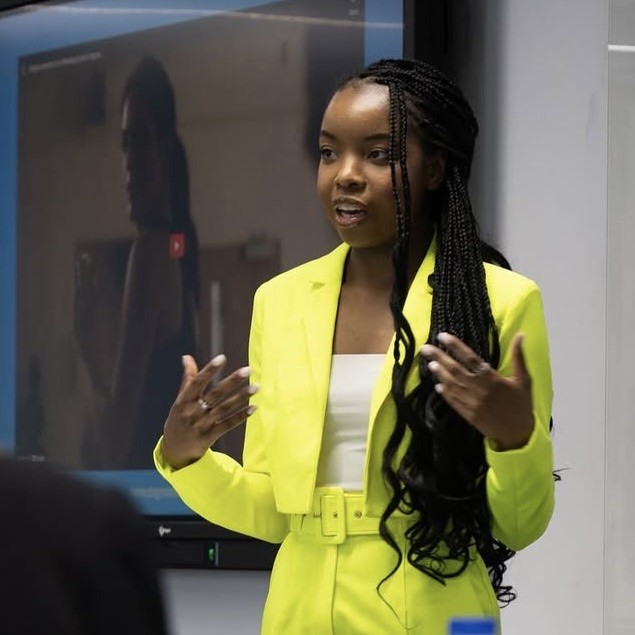
Roehampton Business Laboratory
Our enterprise incubator will support you in developing and scaling entrepreneurial ideas. It also houses signature initiatives like the RISE Prize and the Dragon's Den Style Launchpad showcase.
Celebrating innovation at the LaunchPad start-up awards 2025

World-class library
Home to hundreds of thousands of books, over 1,000 seats, and modern, collaborative and silent study spaces. You'll also have access to a vast range of online resources, like e-books, journals, and databases whenever you want.
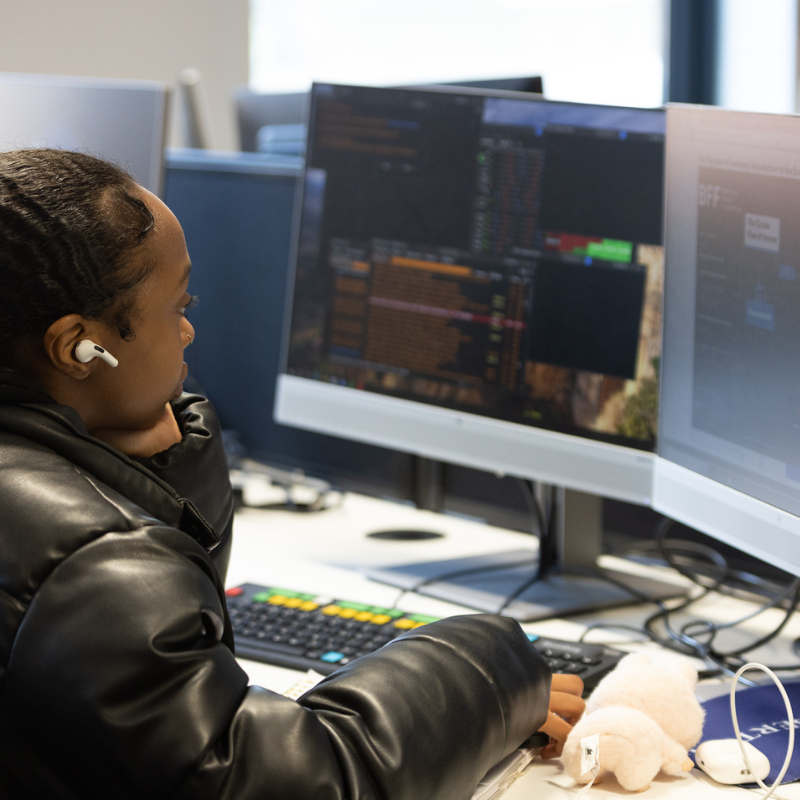
Bloomberg Trading Room
You'll have access to the same powerful tools that professionals use to analyse real-time finance and economics data, stay ahead of the curve with the latest insights, and build the skills that will set you apart in the competitive finance industry.
Open days
Get a real taste of our campus, community and what it’s like to study at Roehampton
Applying
Full-time UK undergraduate students apply through UCAS.
Entry tariff
96–112 UCAS points (or equivalent)
Foundation Year: 64–80 UCAS points (or equivalent)
Looking to work out your UCAS points or find out about our entry requirements? Find out more.
When we consider applications to study with us, we form a complete view of your achievements to date, and future potential, and can offer flexibility in entry requirements. Find out more about our Contextual Offer scheme.
General entry requirements
International undergraduate students apply through our direct application system.
Entry tariff
96–112 UCAS points (or equivalent)
International Foundation Pathway:
64 UCAS (or equivalent)
IELTS: 5.5
Looking to work out your UCAS points or find out about our entry requirements? Find out more.
When we consider applications to study with us, we form a complete view of your achievements to date, and future potential, and can offer flexibility in entry requirements. Find out more about our Contextual Offer scheme.
General entry requirements
Fees and funding
UK students
Tuition fees
| Entry date | Undergraduate Year 1 | Undergraduate Foundation Year |
|---|---|---|
| September 2026 | £9,790 | £5,914 |
Prices shown are for the first year of your degree.
Funding your studies
We also provide other ways to support the cost of living, including on-campus car parking, hardship support and some of the most affordable student accommodation and catering in London.
International students
Tuition fees
| Entry date | Undergraduate Year 1 | Undergraduate Foundation Year | International Foundation Pathway |
|---|---|---|---|
| September 2026 | £17,628 | £17,628 | £17,628 |
Prices shown are for the first year of your degree.
Funding your studies
We also provide other ways to support the cost of living, including on-campus car parking, hardship support and some of the most affordable student accommodation and catering in London.


